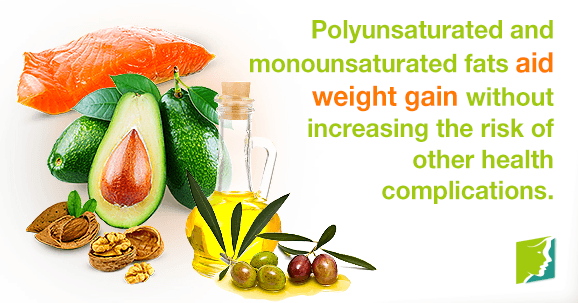Maintaining a healthy weight is essential for energy, strong bones, and the immune system. A person can lose weight for a variety of reasons; sometimes weight loss is deliberate, and sometimes it's the side effect of illnesses like hyperthyroidism, glandular fever, or depression. Body mass index (BMI) is calculated based on the weight a person should be in relation to their height. If your BMI is below healthy range, you may be underweight and at risk of conditions such as anemia and osteoporosis. However, you can gain weight responsibly by making sensible changes to your diet.
Junk Food and Weight Gain
While it may be tempting to gorge on fast food and treats such as cakes, chips, fries, and chocolate, these contain high quantities of salt, sugar, and saturated fat.
Consuming salt in excess increases the risk of coronary diseases such as heart disease, and the sugar content of these foods means that while you may experience a small initial burst of energy after eating them, this will be followed by a "crash", or a feeling of lethargy.
Saturated fats increase cholesterol levels and thus increase the likelihood of coronary diseases. What's more, weight gained from saturated fat intake will add flabby fat tissue rather than lean body mass.
Good Fats
It is a myth that all fats are unhealthy. Eating plenty of polyunsaturated and monounsaturated fats will aid weight gain without increasing the risk of other health complications. These fats replace unhealthy saturated fats in the body, and the body is able to convert them into energy. Avocado, olive oil, unsalted nuts, and oily fish (e.g., salmon and mackerel) are all great sources of "good" fats to eat for healthy weight gain.
A Healthy Diet
Gaining weight is essentially about consuming more energy than the body burns off. Starchy carbohydrates, such as wholegrain pasta, brown rice, potatoes, or lentils, are all high-calorie sources that will provide energy without the side effect of sluggishness, so use these as a base to plan your meals around.
Choose lean proteins - like chicken, tofu, and fish - to eat with your carbohydrates, and consume three portions of calcium a day to strengthen your bones, which may have been weakened if you've been underweight for a long time. One portion of calcium is equal to 1/3 pint of milk, a yogurt, or a matchbox-sized piece of cheese.
Gaining weight doesn't mean cutting out other low-fat snacks, either. Despite their low calorie content, it is still important to eat five portions of fruit and vegetables a day, as these provide many of the vitamins and nutrients the body needs to function at its best.
While this may sound like a lot to fit in to your diet every day, different food groups can be combined in each meal and snack to ensure you are consuming your nutritional quotas. For example, you could make porridge with milk topped with chopped fruit for breakfast, drink a juice or fruit smoothie with nuts as a snack, and try topping a jacket potato with tuna and avocado for a main meal.
Recommendation
If illness was what caused your weight loss, consult with your doctor about the safety of adjusting your diet and get advice about ways to gain weight that are suited to your condition. Exercise is helpful for adding mass; minimize cardiovascular workouts and opt for strength training using weights to build muscle tissue. After changing your diet, be aware that it may take a while for weight gain to become noticeable. This is because you are building lean body mass healthily, rather than piling on body fat by eating junk food.
Sources
- Columbia Health. (2009). Avocados are fatty - are they healthy? Retrieved February 22, 2016, from http://goaskalice.columbia.edu/avocados-are-fatty-are-they-healthy
- The Harvard Medical School Family Health Guide. (2007). The truth about fats: Bad and good. Retrieved February 22, 2016, from http://www.health.harvard.edu/fhg/updates/Truth-about-fats.shtml
- National Health Service UK. (2015). How can I gain weight safely? Retrieved February 22, 2016, from http://www.nhs.uk/chq/pages/2302.aspx?categoryID=51&
- National Health Service UK. (2014). Underweight adults. Retrieved February 22, 2016, from http://www.nhs.uk/Livewell/Goodfood/Pages/Underweightadults.aspx
- Office on Women's Health. (2008). Fats. Retrieved February 22, 2016, from http://womenshealth.gov/fitness-nutrition/nutrition-basics/fats.html




